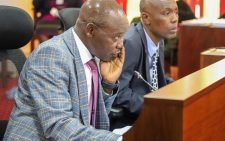Kenyans could be consuming substandard cooking oil because the importing agency allegedly botched the handling of the commodity, members of a Senate committee heard yesterday.
Of the total 73 consignments that the Kenya National Trading Corporation (KNTC) shipped in from Malaysia, the Kenya Bureau of Standards (Kebs) told lawmakers it cleared only 44.
Of those cleared, eight consignments comprising 293,800 twenty-litre jerricans (5.87million litres) were found to be substandard.
Six of the 73 consignments imported between May and November 2023, Kebs said, are in the submission stage and were yet to be approved for release, while 23 others had not reached customs.
Lab tests showed that the oil had insufficient levels of vitamin A in the final product, Kebs Managing Director Esther Ngari members of the Senate Trade Committee.
The presence of high amounts of insoluble impurities, she added, could accelerate the oxidation o the oil, potentially shortening its shelf life
Vitamin A is a fortificant added to cooking oil at levels of 20 to 40 milligrams as one way of addressing the deficiency of the mineral in the population.
She said: “Of the eight sampled consignments, a total of seven failed vitamin A [tests], while one consignment failed in both insoluble impurities and vitamin,” Ngari said.
After Kebs discovered the eight consignments were substandard, the agency wrote to KNTC asking it to, within 30 days, ship back the supply or destroy it at the cost of the importer.
But the consignments were not destroyed, because by the time the 30 days were lapsing, the Directorate of Criminal Investigations had started investigating the matter.
She said: “I wish to state that we tested the eight containers and the result showed they failed. The other containers came in different.” The agency declared the product substandard because it did not meet Vitamin A requirements.
Asked why Kebs released 36 containers to KNTC even when eight of them had been found to be unfit for human consumption, Ngari clarified that her agency did not pretest the product as it had a certificate of conformity from SGS, a company the agency had contracted to inspect the goods in the country of origin.
But senators still demanded to know why Kebs proceeded to allow the 36 containers of the product to be released to the market when tests on some of them had been declared unfit.
Jackson Mandago (Uasin Gishu) sought to know why Kebs failed to recall all the imports after all the samples failed the tests.
“Now, when you do something and you find out [that] of 10, seven samples have failed, what does that say about Kebs?” he said.
“Would you still go ahead and approve the rest of the shipment or the sample should act as a red flag.”
Betty Montet (nominated) asked: “You want to tell us that the rest of the … consignments, which are 36, you released them to Kenyans and did nothing about that?”
Mohamed Chute (Marsabit) and Karungo Thang’wa (Kiambu) sought to know what Kebs did to the consignment after the 30 days elapsed.
In particular, Chute demanded to know where the substandard oil was being sold.
He said: “The first consignment came in June and the last one in November and you all rejected them. I want to ask you, when you found out that the first consignment was substandard, what action did you take?
“We want to know exactly where this oil is being sold so that if it is Marsabit county, I can tell my people not to consume it.”
Okoiti Omtatah (Busia) raised concerns that four of the rejected consignments came from Multi Commerce FZC, three from Inno Wangs (which was not on the supplier list), and one from Ascent Group (which was also not on the supplier list).
















